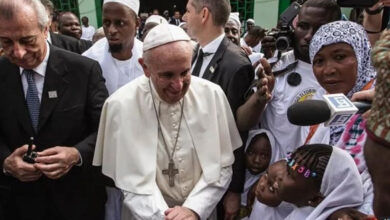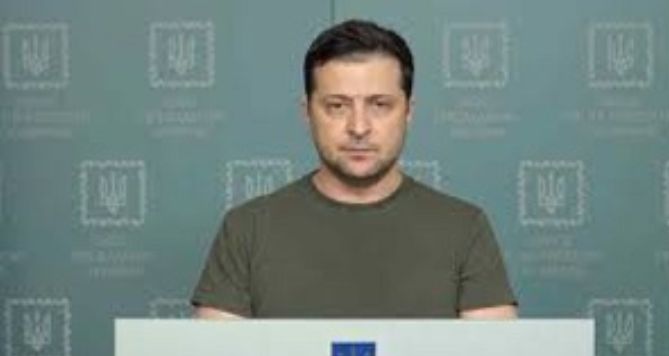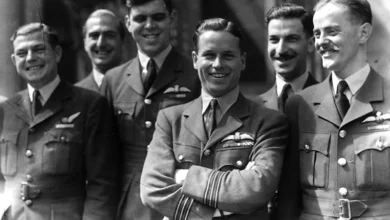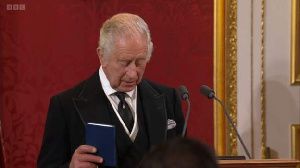How ordinary Poles are preparing for a Russian invasion
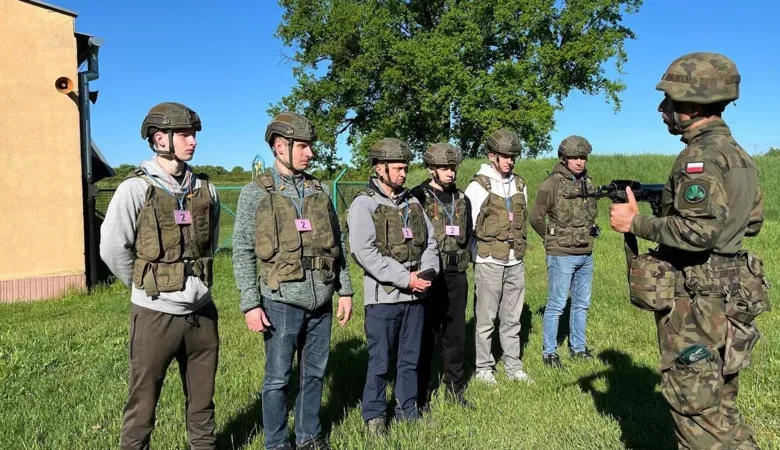
At a military training ground near the city of Wroclaw, ordinary Poles are lining up, waiting to be handed guns and taught how to shoot. “Once the round is loaded, the weapon is ready to fire,” barks the instructor, a Polish soldier, his face smeared with camouflage paint.
Young and old, men and women, parents and children, they’ve all come here for one reason: to learn how to survive an armed attack.
As well as a turn on the shooting range, this Saturday morning programme, called “Train with the Army”, also teaches civilians hand-to-hand combat, first aid and how to put on a gas mask.
“The times are dangerous now, we need to be ready,” says the co-ordinator of the project, Captain Adam Sielicki. “We have a military threat from Russia, and we are preparing for this.”
Capt Sielicki says the programme is oversubscribed, and the Polish government now has plans to expand it so that every adult male in the country receives training. Poland, which shares borders with both Russia and Ukraine, says it will spend almost 5% of GDP on defence this year, the highest in Nato.
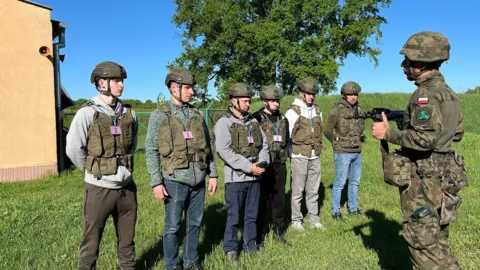
Last week, Prime Minister Donald Tusk said Poland aims to build “the strongest army in the region”. Warsaw has been on a spending spree, buying planes, ships, artillery systems and missiles from the US, Sweden and South Korea, among others.
Dariusz is one of those attending the Saturday course in Wroclaw, and says he would be the “very first” to volunteer if Poland were attacked. “History has taught us that we must be prepared to defend ourselves on our own. We cannot rely on anyone else. Today alliances exist, and tomorrow they are broken.”
As he removes his gas mask, Bartek says he thinks most Poles “will take up arms” if attacked, “and be ready to defend the country.”
Agata is attending with a friend. She says the election of Donald Trump has made people more worried. “He wants to pull out [of Europe]. That’s why we feel even less safe. If we’re not prepared and Russia attacks us, we’ll simply become their prisoners.”
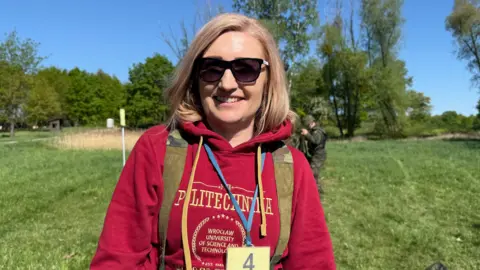
Statements by Donald Trump and members of his administration have caused deep concern among officials in Warsaw. During a visit to the Polish capital in February, the US defence secretary Pete Hegseth said Europe mustn’t assume that the US troop presence on the continent “will last forever”.
The US currently has 10,000 troops stationed in Poland, but Washington announced last month it was pulling out of a key military base in the city of Rzeszow in the east of Poland. Officials say the troops will be redeployed within Poland, but the move has caused yet more unease in the country.
Donald Trump’s apparent hostility towards Ukrainian President Volodymyr Zelensky, and warm words for Russia’s Vladimir Putin, have only added to the worry.
Poland is due to sign a defence agreement with France in the coming days, and another pact with the UK is in the pipeline – further moves by Warsaw to pivot away from its historically strong military ties with Washington. There is also talk of Poland being brought under the French military’s “nuclear umbrella”.
“I think [Trump] has certainly pressed us to think more creatively about our security,” says Tomasz Szatkowski, the permanent representative of Poland to Nato and presidential advisor on defence. “I think the US can’t afford to lose Poland, because that would be a sign… that you can’t rely on the US. However, we do have to think of other options and develop our own capabilities.”
“If the Russians continue their aggressive intentions towards Europe, we’re going to be the first one – the gatekeeper,” Mr Szatkowski says. He ascribes Poland’s rapid military build-up to “first of all, the geopolitical situation, but also, the experience of history.”
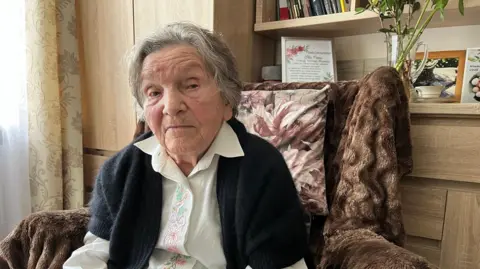
The painful legacy of Russian occupation can be felt everywhere here.
At a state-run care home in Warsaw, 98-year-old Wanda Traczyk-Stawska recalls the last time Russian forces invaded – in 1939, when a pact between Stalin and Hitler resulted in Poland being carved up between the USSR and Nazi Germany.
“In 1939 I was twelve years old. I remember my father was very concerned about [the Russians],” Wanda recalls, “We knew that Russia had attacked us, they took advantage of the fact that the Germans had exposed us.”
On a shelf is a photograph of Wanda as a fighter, brandishing a machine gun during the Warsaw Uprising of 1944, when the Polish underground fought the German Army amidst the ruins of the city. After pushing back the Germans in the dying days of World War Two, the Soviet Union installed a pro-Moscow regime in Poland, which ruled the country until 1989.
Currently, around 216,000 servicemen and women make up the Polish armed forces. The government says they intend to increase that to half a million, including reservists – which would give it the second-largest military in Nato after the United States.
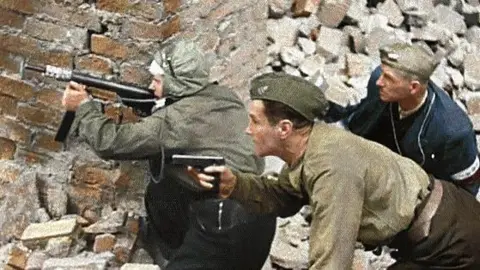
I ask Wanda whether she thinks it’s a good thing that Poland is building up its military. “Of course, yes. Russia has this aggression written into its history. I’m not talking about people, but the authorities are always like that,” she sighs. “It is better to be a well-armed country than to wait for something to happen. Because I am a soldier who remembers that weapons are the most important thing.”
Eighty years since the end of World War Two, Poles are once again eyeing their neighbours nervously. In a warehouse in southern Poland, by popular demand, one company has constructed a mock-up of a bomb shelter.
“These shelters are designed primarily to protect against a nuclear bomb, but also against armed attacks,” says Janusz Janczy, the boss of ShelterPro, who shows me around the steel bunker, complete with bunk beds and a ventilation system. “People are building these shelters simply because they don’t know what to expect tomorrow.”

Janusz says demand for his shelters has soared since Donald Trump took office. “It used to be just a few phone calls a month. Now there are dozens a week,” he says, “My clients are most afraid of Russia. And they’re concerned that Nato wouldn’t come to defend Poland.”
But are Poles ready to defend the country if those fears become a reality? A recent poll found that only 10.7% of adults said they would join the army as volunteers in the event of war, and a third said they would flee.
On a sunny afternoon in Wroclaw, I ask Polish students whether they’d be ready to defend their country if attacked. Most say they wouldn’t. “The war is very close but feels quite far,” says medical student Marcel, “but if Russia attacked, I think I’d run.”
“I would probably be the first one trying to escape the country,” says another student, Szymon. “I just don’t really see anything worth dying for here.”
Source: bbc.com

